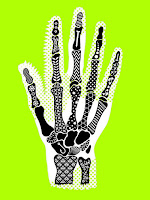For Foucault, then, the nonhuman impresses itself onto anthropic space through the production of laws and regulations, the production of material infrastructures that manipulate human behavior and perception, and the enforcement of practices that condition human beings. In Foucault’s understanding, the human is always born into a larger historical condition that is not of the same kind as any one person’s individual experience, an experience that is, to an indeterminate degree, an effect of historical trends rather a starting point for historical evaluation.
Similarly, for Deleuze, nonhuman forces already act on the inside of human experience. Here all knowing is an inter-species effort; multiple species are always on the inside of anthropomorphic space, undermining it from within. The Kantian transcendental subject is for Deleuze a complex and multiple collective of diverging syntheses of cognition and perception. If Foucault initiates a move from the transcendental a priori to the historical a priori then Deleuze initiates a similar movement—from an historical a priori to an ecological a priori. Crucially, the enfolding of divergent species into human cognition marks not just an ecological basis for all human thought—a mark that suggests that all human thought is dependent on a multiplicity of nonhumans living and dying on the inside of human subjectivity—but more cosmically that human cognition is a higher dimensional enfolding of spacetime itself, a synthesis that makes the vastness of the cosmos thinkable to the human mind.What I like about Adam's framing of F & D here is his seemless demonstration of how each of these Frenchies are already thinking ecologically in their appeals to structure and materiality, without having explicitly stated as such. Reading Adam's post (here) reminds me exactly why the work of these two gents is so near and dear to me: each attempts to think about the structural dynamics embodied in material relations of power, subjectivity and episteme in an ecological manner.
I cannot stress enough how important it seems to me to find ways of operationalizing the insight that nonhuman forces always already act on the "inside" of human experience, as the non-human-in-human - the dark flesh conditioning and positioning hominid experience. Experiencing bodies are complex multiplicities of synthesizing assemblage - higher dimensional enfoldings of space-time...
"[M]an and nature are not like two opposite terms confronting each other – not even in the sense of bipolar opposites within a relationship of causation, ideation, or expression (cause and effect, subject and object, etc); rather they are one and the same essential reality, the producer-product" (Anti-Oedipus, p. 4-5).














